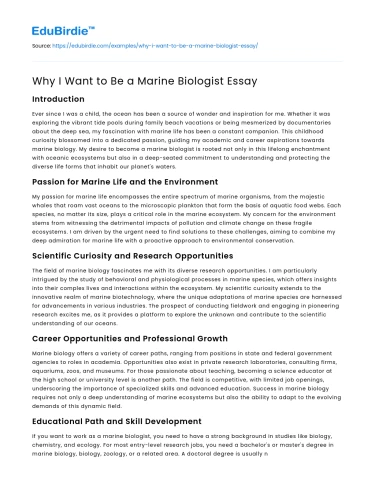Introduction
Ever since I was a child, the ocean has been a source of wonder and inspiration for me. Whether it was exploring the vibrant tide pools during family beach vacations or being mesmerized by documentaries about the deep sea, my fascination with marine life has been a constant companion. This childhood curiosity blossomed into a dedicated passion, guiding my academic and career aspirations towards marine biology. My desire to become a marine biologist is rooted not only in this lifelong enchantment with oceanic ecosystems but also in a deep-seated commitment to understanding and protecting the diverse life forms that inhabit our planet's waters.
Passion for Marine Life and the Environment
My passion for marine life encompasses the entire spectrum of marine organisms, from the majestic whales that roam vast oceans to the microscopic plankton that form the basis of aquatic food webs. Each species, no matter its size, plays a critical role in the marine ecosystem. My concern for the environment stems from witnessing the detrimental impacts of pollution and climate change on these fragile ecosystems. I am driven by the urgent need to find solutions to these challenges, aiming to combine my deep admiration for marine life with a proactive approach to environmental conservation.
Save your time!
We can take care of your essay
- Proper editing and formatting
- Free revision, title page, and bibliography
- Flexible prices and money-back guarantee
Scientific Curiosity and Research Opportunities
The field of marine biology fascinates me with its diverse research opportunities. I am particularly intrigued by the study of behavioral and physiological processes in marine species, which offers insights into their complex lives and interactions within the ecosystem. My scientific curiosity extends to the innovative realm of marine biotechnology, where the unique adaptations of marine species are harnessed for advancements in various industries. The prospect of conducting fieldwork and engaging in pioneering research excites me, as it provides a platform to explore the unknown and contribute to the scientific understanding of our oceans.
Career Opportunities and Professional Growth
Marine biology offers a variety of career paths, ranging from positions in state and federal government agencies to roles in academia. Opportunities also exist in private research laboratories, consulting firms, aquariums, zoos, and museums. For those passionate about teaching, becoming a science educator at the high school or university level is another path. The field is competitive, with limited job openings, underscoring the importance of specialized skills and advanced education. Success in marine biology requires not only a deep understanding of marine ecosystems but also the ability to adapt to the evolving demands of this dynamic field.
Educational Path and Skill Development
If you want to work as a marine biologist, you need to have a strong background in studies like biology, chemistry, and ecology. For most entry-level research jobs, you need a bachelor's or master's degree in marine biology, biology, zoology, or a related area. A doctoral degree is usually needed for jobs in advanced research and as a professor.
In addition to basic science knowledge, math, statistics, and computer science skills are becoming more and more useful in the area. Being able to communicate clearly is just as important for publishing study as it is for working on environmental policy and advocacy. This wide range of skills is necessary to deal with the many difficulties in marine biology.
Conclusion
In conclusion, my journey towards becoming a marine biologist is fueled by a deep-rooted passion for the ocean and its myriad inhabitants. My aspiration is not only to delve into the mysteries of marine life but also to make meaningful contributions towards preserving this vital part of our planet. As I embark on this path, I am committed to employing my knowledge and skills towards impactful research and conservation efforts. I envision a future where my work as a marine biologist not only advances scientific understanding but also plays a crucial role in safeguarding the health and diversity of our oceans for generations to come.






 Stuck on your essay?
Stuck on your essay?

